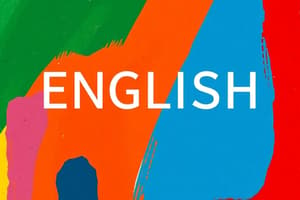Podcast
Questions and Answers
Which historical event had the MOST profound impact on the transition from Old English to Middle English?
Which historical event had the MOST profound impact on the transition from Old English to Middle English?
- The Great Vowel Shift, which altered the pronunciation of vowels.
- The Renaissance, bringing classical influences to English literature.
- The Viking invasions, which contributed Old Norse vocabulary to the language.
- The Norman Conquest of 1066, introducing Norman French influence. (correct)
Why is English considered a West Germanic language?
Why is English considered a West Germanic language?
- Because it evolved from Anglo-Saxon dialects brought to Britain by Germanic settlers. (correct)
- Because its phonology shares many features with Slavic languages.
- Due to its extensive borrowing of vocabulary from Romance languages.
- Because its grammar is primarily based on Latin structures.
Which of the following BEST explains the difference between phonemes and allophones in English?
Which of the following BEST explains the difference between phonemes and allophones in English?
- Phonemes are units of sound only found in formal speech; Allophones are units of sound only found in informal speech.
- Phonemes are the basic units of sound that distinguish meaning; allophones are variations of a phoneme that do not change meaning. (correct)
- Phonemes are variations of a sound that change the meaning an allophone conveys; allophones are the basic units of sound.
- Phonemes and allophones are interchangeable terms that represent any distinct sound in a language.
Which sentence exemplifies a compound-complex sentence structure?
Which sentence exemplifies a compound-complex sentence structure?
How does derivational morphology differ from inflectional morphology in English?
How does derivational morphology differ from inflectional morphology in English?
Which of the following BEST describes the role of prepositions in English grammar?
Which of the following BEST describes the role of prepositions in English grammar?
In the context of English syntax, what is the primary function of a clause?
In the context of English syntax, what is the primary function of a clause?
What is the significance of the Great Vowel Shift in the history of Modern English?
What is the significance of the Great Vowel Shift in the history of Modern English?
Which of the following best illustrates the nuanced distinction between pragmatics and semantics?
Which of the following best illustrates the nuanced distinction between pragmatics and semantics?
How does the interactionist theory uniquely contribute to our understanding of language acquisition, setting it apart from behaviorist and nativist perspectives?
How does the interactionist theory uniquely contribute to our understanding of language acquisition, setting it apart from behaviorist and nativist perspectives?
In what scenarios would code-switching within a multilingual community be considered a demonstration of pragmatic competence rather than simply a performance error?
In what scenarios would code-switching within a multilingual community be considered a demonstration of pragmatic competence rather than simply a performance error?
Which of the following scenarios most clearly exemplifies the literary concept of unreliable narrator and its impact on textual interpretation?
Which of the following scenarios most clearly exemplifies the literary concept of unreliable narrator and its impact on textual interpretation?
How does the application of computational linguistics specifically enhance the field of natural language processing (NLP) in complex scenarios?
How does the application of computational linguistics specifically enhance the field of natural language processing (NLP) in complex scenarios?
In what fundamental way does Noam Chomsky's theory of Universal Grammar challenge behaviorist perspectives on language acquisition?
In what fundamental way does Noam Chomsky's theory of Universal Grammar challenge behaviorist perspectives on language acquisition?
Which of the following best illustrates the concept of presupposition in pragmatics?
Which of the following best illustrates the concept of presupposition in pragmatics?
Which of the following constitutes a key divergence in theoretical focus between sociolinguistics and psycholinguistics?
Which of the following constitutes a key divergence in theoretical focus between sociolinguistics and psycholinguistics?
How does the concept of 'face' in politeness theory affect cross-cultural communication, and what strategies can mitigate potential conflicts?
How does the concept of 'face' in politeness theory affect cross-cultural communication, and what strategies can mitigate potential conflicts?
What critical distinction differentiates pidgins from creoles in linguistic development?
What critical distinction differentiates pidgins from creoles in linguistic development?
In literary analysis, how does a formalist approach differ fundamentally from a Marxist perspective in interpreting a novel?
In literary analysis, how does a formalist approach differ fundamentally from a Marxist perspective in interpreting a novel?
How might an applied linguist contribute to the improvement of second language acquisition for adult learners with diverse learning styles?
How might an applied linguist contribute to the improvement of second language acquisition for adult learners with diverse learning styles?
What distinguishes balanced literacy from both phonics-based and whole language approaches to literacy instruction?
What distinguishes balanced literacy from both phonics-based and whole language approaches to literacy instruction?
How does deixis fundamentally challenge the notion of fixed meaning in language, and what are its implications for translation?
How does deixis fundamentally challenge the notion of fixed meaning in language, and what are its implications for translation?
Considering the nuances of sentence structure, how can a compound-complex sentence be strategically employed to enhance clarity and convey complex relationships between ideas?
Considering the nuances of sentence structure, how can a compound-complex sentence be strategically employed to enhance clarity and convey complex relationships between ideas?
Flashcards
What is English?
What is English?
A West Germanic language originating from Anglo-Saxon dialects in Britain.
What is Old English?
What is Old English?
A period of English from approximately 450-1150 AD, influenced by Germanic languages and Old Norse.
What is Middle English?
What is Middle English?
The period of English from approximately 1150-1500 AD, significantly influenced by Norman French after the Norman Conquest.
What is Modern English?
What is Modern English?
Signup and view all the flashcards
SVO?
SVO?
Signup and view all the flashcards
What is a Phoneme?
What is a Phoneme?
Signup and view all the flashcards
What is a Morpheme?
What is a Morpheme?
Signup and view all the flashcards
What is Syntax?
What is Syntax?
Signup and view all the flashcards
Simple Sentence
Simple Sentence
Signup and view all the flashcards
Compound Sentence
Compound Sentence
Signup and view all the flashcards
Complex Sentence
Complex Sentence
Signup and view all the flashcards
Compound-Complex Sentence
Compound-Complex Sentence
Signup and view all the flashcards
Semantics
Semantics
Signup and view all the flashcards
Synonymy
Synonymy
Signup and view all the flashcards
Antonymy
Antonymy
Signup and view all the flashcards
Hyponymy
Hyponymy
Signup and view all the flashcards
Meronymy
Meronymy
Signup and view all the flashcards
Pragmatics
Pragmatics
Signup and view all the flashcards
Speech Acts
Speech Acts
Signup and view all the flashcards
Implicature
Implicature
Signup and view all the flashcards
Pidgins
Pidgins
Signup and view all the flashcards
Creoles
Creoles
Signup and view all the flashcards
Phonics
Phonics
Signup and view all the flashcards
Study Notes
The provided text contains the same information as the existing notes therefore no new information was added.
Studying That Suits You
Use AI to generate personalized quizzes and flashcards to suit your learning preferences.




